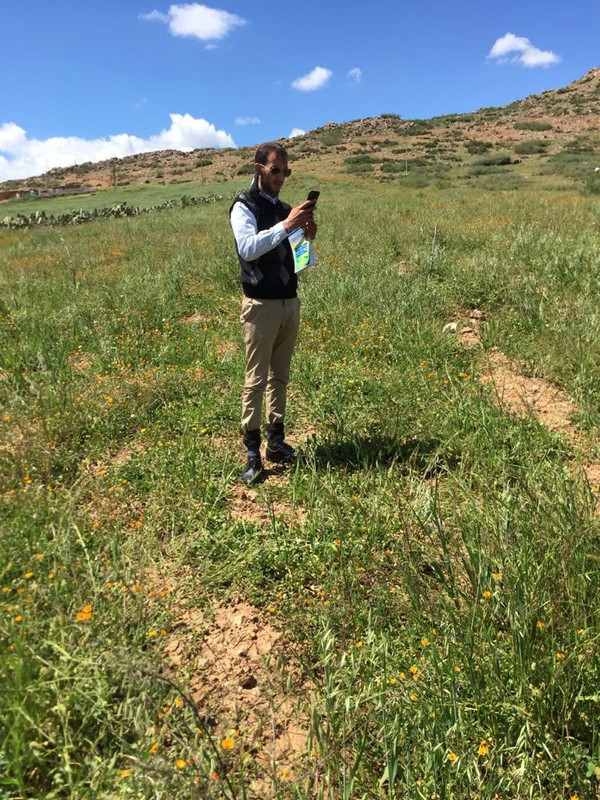Q&A with HAF President Yossef Ben-Meir about HAF’s Carbon Sequestration Model
HAF has ambitions to enhance the monitoring of its trees, measure carbon sequestration at a scientifically and socially responsible standard, and promote reinvestment back into the sustainable development of farming communities in Morocco. We asked four questions to President Yossef Ben-Meir in an effort to better understand HAF’s model for sustainability and growth:
Question 1: How can we generate carbon offsets, and why in Morocco is it a special opportunity?
Answer: Morocco is in a situation in its rural countryside that requires its approximately 11 million person population to significantly transition from growing barley and corn to more lucrative crops, and fruit trees figure very highly as a goal in regards to this transition.
The reason is Morocco is very fortunate in that there are 14 varieties of fruit trees and many sub-species within a single variety that grow endemically here, or organically. There are ten varieties of fig, for example. There’s a variety of carob, apple, and date that exist only here in all the world, and argan of course is endemic to this nation. Very few nations of the world grow almond, and Morocco is such a country. Morocco also grows walnut, lemon, and cherry, all organically. Most poverty in the country exists in rural places. Most rural incomes are derived from agriculture, and it’s that barley and corn that’s keeping farmers down. That transition is therefore also putting huge upwards pressure on fruit trees, and the price is going up.
We plant nurseries with communities, and, in our years in service, we’ve planted 4 million trees. We’ve done 700,000 in just this year in 2021 – and thank you so many partners, most especially Ecosia.
So this represents a huge opportunity. As we monitor these trees they can also be certified in regards to the amount of CO2 they sequester in the ground or in the body of a tree, for example. Certification then enables the commercialization of offset credits.
For us so far, we’ve been able to measure that 24 trees after a 5 year period can sequester 1 ton of carbon. We’re also able to plant 24 trees at 40 cents (USD) per tree, so, therefore, the cost of sequestering 1 ton of carbon is $9.60, and that’s a highly competitive price. We’re able to achieve that relatively low price because we grow the trees from seeds. There’s huge value that’s saved or retained by the community by not having to go to private nurseries to meet their tree needs but rather grow the trees themselves from seeds and 15-cm cuttings or offshoots from other trees.
The more that there are local, national, and global requirements or internalized ethical necessities to offset the carbon that we as people, as part of organizations, emit, the more investment in offsets and tree planting will occur. And we need to do this because our planet, life, future, food security, water retention, livelihoods, and also gender justice and interfaith arrangements come about from tree planting, as they do with the High Atlas Foundation.
We plant with Muslim, Christian, and Jewish people together. We plant with teenage young women, girls who have been denied secondary school, and we support their building tree nursery enterprises. We plant with boys detained as teenagers who leave these centers without employable skills and who feel alienated, and we plant and build confidence with them.
So each tree you see is actually also a hugely important story of fairness and opportunity for people who need it and are most deserving of it. We hope that you offset your carbon with us, which means that you will plant trees with farming families, youth, women, and people of all backgrounds.

Women of the Alkhayr Women’s Cooperative located in the Guercif province of the Oujda region are planting olive cuttings in their new nursery that will provide them and some thousands of farming households a vital sustainable livelihood initiative.
Question 2: Who is our market for the carbon offsets? What’s our process for engaging them and coming to an agreement?
Answer: Our process of engagement really centers around information sharing.
Our approach is really about inspiring people by way of sharing knowledge about Morocco, the situations its farming families face, and the incredible natural wonder of having so many varieties of fruit and medicinal plants that grow without the application of pesticides, and that’s just a blessing of geography, nature, and vast diversity of landscape.
So our way of conveying and enabling or bringing about partnerships to secure carbon offsets is about telling Morocco’s story as it relates also to multiculturalism – because planting with us is also a way of bringing together people of different faiths and ethnic backgrounds, and that solidarity is Moroccan.
The other way of working to inspire others is letting people know that gender justice also comes about by planting a tree. We develop partnerships and dedicate resources and capacity building with women and girls who have been denied education beyond primary school.
So when we hear their narratives and their life experiences and how planting a tree can bring about opportunity and fairness in social, economic, and environmental ways then that information touches the heart and touches the mind, and hopefully the listener and the one who observes will then want to contribute and help us make a difference.
So planting trees and carbon offsets are just a direct way of enabling all of these things to happen. That’s our strategy; it’s by way of inspiration.

HAF nursery caretaker and tree monitoring officer Abdelilah surveys land in the area surrounding Ifrane and tracks trees with GPS points.
Dr. Yossef Ben-Meir is a sociologist and the President of the High Atlas Foundation.